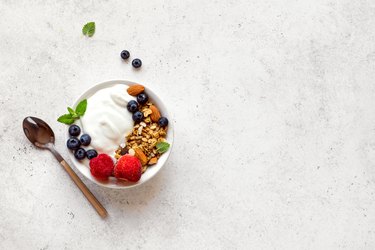
Anyone who gets chronic headaches, especially migraines, knows they can be tricky to manage and prevent. Dairy is a commonly suspected culprit, and a possible dietary trigger based on research. Here's what you should know and can do if you think you're susceptible to dairy headaches.
Headache Triggers
Video of the Day
Headaches are common in adults, but there are different types, and multiple headache triggers. The National Headache Foundation (NHF) notes that true food allergies (which cause an immune reaction) are not usually a factor in headaches. The most common headache and migraine factors, the NHF says, are:
Video of the Day
- Alcohol
- Smoking
- Caffeine withdrawal
- Stress and tension
- Eye strain
- Hunger or dehydration
- Hormones
- Weather and temperature changes
- Seasonal allergies
In addition, NHF acknowledges that some people have sensitivities to certain foods, which may incite headaches. A November 2016 review, published in Current Neurology and Neuroscience Reports, found that up to 64 percent of those who get migraine headaches report food triggers as the reason. Much of the research to date has examined whether headaches are linked to alcohol, caffeine, dairy, food additives and artificial sweeteners.
Read more: Can Sugar Cause Headaches?
Does Dairy Cause Headaches?
With the exception of tyramine in aged cheeses, the research on dairy and headaches has yielded mixed results. For instance, the review in Current Neurology and Neuroscience Reports points out that processed dairy foods like cheese and ice cream are more often reported as triggers than plain milk.
On the other hand, a study involving nearly 84,000 university students, published in January 2020 in Complementary Therapies in Medicine, found that dairy intake was inversely associated with headaches. In fact, those who consumed the most dairy foods were 19 percent less likely to have headaches.
One reason for the mixed findings on dairy is that, unlike food allergies, food sensitivities can be hard to pinpoint.
A review of studies on migraines and food sensitivity testing, published in November 2019 in Current Pain and Headache Reports, notes that food sensitivities may trigger inflammation in the body, which may cause skin rashes, digestive symptoms, fatigue and headaches. However, not only can the symptoms vary, but they also may take hours or days to appear, which makes it difficult to identify the cause.
Susan Linke, RDN, a Dallas dietitian who specializes in food sensitivity testing and what's called LEAP therapy, which is a type of diet therapy to help people manage food sensitivities, agrees that dairy sensitivities are especially complicated. "Milk is comprised of multiple proteins that can cause reactions," she explains. "Depending on which protein a patient is sensitive to, it's possible that one milk product could trigger a response while another would not."
Linke says that a majority of her patients are dairy-sensitive. While cutting out dairy right off the bat might provide some help in managing their headaches, she prefers to guide any eliminations based on food sensitivity testing, food challenges and overall diet and lifestyle improvements. She says that those who have migraines often have multiple food intolerances and vitamin or mineral deficiencies as well as other triggers, like stress or sleep disorders.
Read more: Should I Cut Dairy Out of My Diet?
Tyramine Headaches
Tyramine is a natural substance in food that results from the breakdown of the amino acid tyrosine. However, it's problematic for some people, according to NHF. It builds up in some foods that are aged, fermented or stored for a long time. Think aged cheese or pepperoni pizza.
The foundation recommends limiting high-tyramine foods if you believe you get tyramine headaches, including:
- Dried, aged, salted, fermented and pickled meats, fish and eggs (pepperoni, salami, liverwurst, pickled herring)
- Fermented vegetables and soy foods (sauerkraut, kimchi, miso)
- Fava beans and snow peas
- All nuts and nut butters, pumpkin and sunflower seeds
- All aged cheeses (blue, brie, cheddar, Swiss, provolone)
NHF notes that fresh dairy foods like milk, cottage, ricotta and cream cheese are low in tyramine, whereas yogurt, sour cream and buttermilk have moderate amounts. However, tyramine levels in all foods increase as they age. That means even though fresh dairy foods are lower in tyramine, if they've been in the refrigerator for a while, they'll be higher in the compound and might trigger a headache.
- National Headache Foundation: “The Complete Headache Chart”
- Current Neurology and Neuroscience Reports: “Headaches: A Review of the Role of Dietary Factors”
- Complementary Therapies in Medicine: “Dairy Consumption in Relation to Primary Headaches Among a Large Population of University Students: The MEPHASOUS Study”
- Current Pain and Headache Reports: “The Clinical Use of IgG Food Sensitivity Testing with Migraine Headache Patients: A Literature Review”
- Susan Linke, RDN, CLT, dietitian, CEO, Food Sensitivity Specialists, Dallas
- NHF:"Low-Tyramine Diet For Individuals With Headache or Migraine"
Is this an emergency? If you are experiencing serious medical symptoms, please see the National Library of Medicine’s list of signs you need emergency medical attention or call 911.